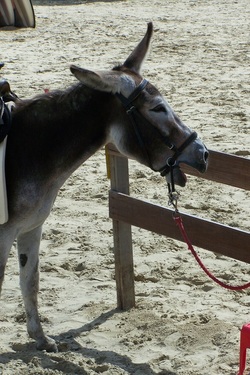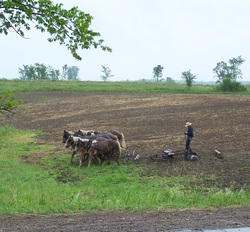 It's nearly done, sadly, but the Beginning Farming 101 class offered by the Cornell Cooperative Extension service has been fascinating. Putting aside the goal of the webinar to make each of us 50 wanna-be farmers successful, the course has offered wonderful glimpses into other worlds. I can only imagine the research and tragedy behind this: "Donkeys are apparently most effective in small, open pastures or where sheep are cohesive and graze together. Feeds containing anabolic agents, such as monesin (Rumensin) and lasalacid (Bovatec), apparently are poisonous to donkeys...." Oh dear. So much is contained in the twice-repeated word "apparently." It's the first truth of farming: if you have livestock, you will have dead stock. But the writer, W.F. Andelt, from the Colorado State University Cooperative Extension in this paper entitled Guard Dogs, Llamas and Donkeys, continues on a rather happier note: "Donkeys can be obtained from the Bureau of Land Management or the U.S. Forest Service under the Wild Free-Roaming Horse and Burro Act for $75." Replacement bargain!  And there's an unexpected symmetry between farming and poetry (I know, newsflash -- I mean not just the usual clichés about pastoral beauty, but actual plant-murder and violent ritual sacrifice. Harsh stuff.) From Cover Crops to Plant in Early Spring, a Cornell Cooperative Extension publication: "April is the best time to kill many overwintering cover crops. They can be killed with an herbicide that works at lower temperatures, and smaller plants can often be killed with shallow disking." Proving that while T.S. might have been wrong about many things, he was right in declaring April as "the cruelest month, breeding lilacs from the dead land, mixing Memory and desire, stirring dull roots with desire." (The Waste Land by T.S. Eliot) The next class I signed up for in the Beginning Farmer program begins in a few months.
2 Comments
greg
11/6/2013 01:39:56 pm
I am distressed that anyone would kill a covercrop with a herbicide. weeds maybe. Just plow it under. then plant before the weeds get back up. We have large farms here (1000's of acres). farming would be very labor intensive without chemicals. For a small family farm stay with natural/organic methods, you will be happier. Donkeys are great for keeping coyotes away in a small farm pasture, and they are entertaining to watch. Makes me want to go back to the farm. Thanks for sharing.
Reply
Amy
11/7/2013 01:33:04 am
Hey Greg --
Reply
Leave a Reply. |
About the Blog
A lot of ground gets covered on this blog -- from sailboat racing to book suggestions to plain old piffle. FollowTrying to keep track? Follow me on Facebook or Twitter or if you use an aggregator, click the RSS option below.
Old school? Sign up for the newsletter and I'll shoot you a short e-mail when there's something new.
Archives
June 2024
Categories
All
|
 RSS Feed
RSS Feed
